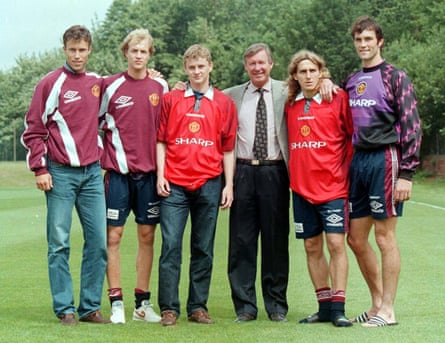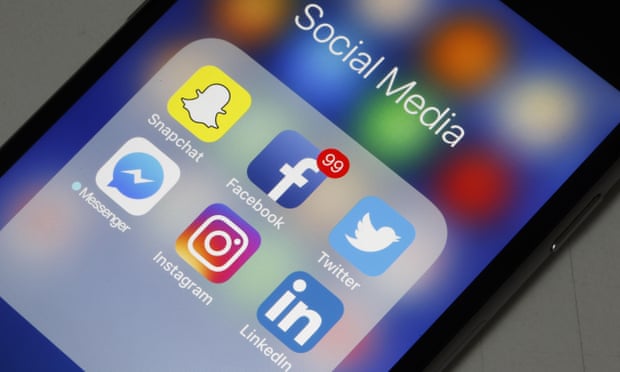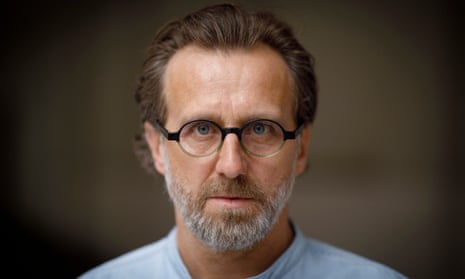“If I arrived at the hospital one day later than I did, this interview would not happen. I arrived at the hospital too late to find out the root of the infection; they put me straight into a coma. After I woke up, they asked me what my name was and the seven times table. All of my face muscles were paralysed – it was an infection of the brain. I spent three weeks quarantined in hospital on powerful antibiotics, directly to the veins. I couldn’t eat, I had to keep my eyes covered because I was so sensitive to light. I was very scared.”
Karel Poborsky still does not know how he got ill in the summer of 2016 – one theory is that a tick living in his beard bit him – but the important thing is that he is now healthy and well. Sitting in the reception of a plush London hotel alongside his long-term partner, Andrea Tomsu, his eyes dance brightly behind a pair of horn-rimmed glasses and he talks animatedly about his life and career.
This article includes content provided by Instagram. We ask for your permission before anything is loaded, as they may be using cookies and other technologies. To view this content, click 'Allow and continue'.
There is no getting away from it: Poborsky is cool. Not in a showy or intimidating way; he exudes both shyness and warmth, while his tattoos – some paying tribute to loved ones, others designed by the Czech artist Musa – are largely hidden by simple but expensive‑looking clothes. Thankfully, he bears no resemblance to the gaunt man who nearly lost his life three years ago and only the most attentive observer would draw comparisons between the 47-year‑old and the shaggy-ponytailed young player who lit up Euro 96, exploits that earned a move to Manchester United.
Euro 96 was an important moment for the Czech Republic, then only three years old, formed by Slovakia’s move to independence. The tournament was their first and fans flocked to England delirious just to be there. The players were happy to train at a Preston primary school and even arranged to play the local side Bamber Bridge a few days before their opening match. “Nobody expected anything from us,” smiles Poborsky. “We were the dark horse. We could only surprise.”
Surprise they did. A 2-0 defeat by Germany was followed by a shock 2-1 win over Italy – during which Poborsky provided a mesmeric cross for Pavel Nedved – and a thrilling 3-3 draw with Russia in which another young prospect, Vladimir Smicer, scored the equaliser.
Poborsky took centre stage in the quarter-finals, scoring one of the goals of the tournament to seal a 1-0 win over Portugal. A unique scoop lob over Vítor Baía from the edge of the penalty area – rather than a chip or a dink – it was a piece of impudent brilliance to decide a tense match. “In the national team, I made nearly 120 appearances and scored only eight times, which shows my game was based around supporting others,” he says. “But some of the goals that I did score were special and looked like that.”
Poborsky scored in a shootout at Old Trafford to knock out France in the semi-final, before a 2-1 defeat by Germany at Wembley. “Before the final, we felt that all of England cheered for us, because Germany beat them in the semi-finals. Inside the tiny, old dressing room, I felt that three-quarters of the stadium supported us, which was an amazing feeling.
“Sir Alex Ferguson came to the hotel in Preston to visit me just before the final and asked me if I wanted to move to Manchester United and obviously I answered yes,” says Poborsky, who was born in Trebon, near the Austrian border, in 1972. “As soon as he heard my answer, he left. One month later, I’m playing in Manchester. You have to realise that I come from a small town of 4,000 people. Growing up in Czechoslovakia under communism, nobody was allowed officially to learn English or German, or anything else. So I had no language skills, nothing.”
Poborsky has spoken elsewhere about how he first found England “a closed, cold country” but says United made a special effort to make him feel welcome. “Everything felt upside down,” he recalls. “My head was spinning. We were seven years after the Velvet Revolution [the collapse of the communist regime] so I arrived from a wild time in the Czech Republic. The language barrier was the biggest issue. It was complicated for United, too. There was only one field at the training ground back then and in the sessions they used hands, flags and gestures. I finally found out what they wanted.

“I was so surprised at how nicely the players accepted me. Now I realise that the more successful and the more confident you are, the easier it is to accept others. You are a team and everybody wanted me to feel welcome. Particularly Eric Cantona and Paul Scholes. Ryan Giggs is also a very nice person.”
Poborsky spent only 18 months at United, largely because of an emerging young talent called David Beckham. “There was no personal rivalry with Beckham,” Poborsky says. “He was very supportive and would often ask about my family. Jordi Cruyff was also there at the time and he also didn’t often play. Sometimes I would play for the reserves, but Jordi would say: ‘No, I’m not going. I’m here for the first team.’ Maybe that’s why the fans liked me and still remember me; because they could see my enthusiasm and that I was ready at all times. It didn’t matter if I played the whole match or just the last minute. I accepted that Beckham was number one and I was second in line.
Quick GuideFollow Guardian sport on social media
Show

Twitter: follow us at @guardian_sport
Facebook: like our football and sport pages
Instagram: our favourite photos, films and stories
“I went to Ferguson and explained that I wanted to play and he found me three or four clubs in England. Small clubs, like Leeds. But I got an offer from Benfica and left for Lisbon in January 1998. After six months, I was voted as the best player in Portugal but still now, my heart beats for Manchester United.”
Following his hugely successful spell at Benfica and a move in 2000 to an absurdly talented Lazio featuring Nedved, Alessandro Nesta, Diego Simeone, Marcelo Salas, Juan Sebastián Verón and Hernán Crespo among others, Poborsky closed out his career in the Czech Republic after helping his country to the semi‑finals of Euro 2004, in which he was the top assist maker. Only Petr Cech has made more appearances for the Czech Republic.
These days Poborsky is an academy director for the Czech Football Association, when not playing golf with Nedved, and he has been announced as an ambassador for Euro 2020. Poborsky will take part in the Treble Reunion match on 26 May at Old Trafford between United and Bayern Munich legends, 20 years to the day since their famous Champions League final. Poborsky had left the club by 1999 but received an invitation for being a great supporter of the Manchester United Foundation, which the game is in aid of.
Fans won’t be able to watch his hair bobbing along the right wing – Ferguson once described Poborsky as “looking as though he was going to play for Led Zeppelin rather than United” – but what about his pace? “We will see,” he says with a smile.

Comments (…)
Sign in or create your Guardian account to join the discussion